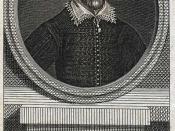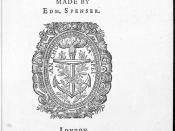Sonnet 1 by Edmund Spenser and Sonnet 130 by William Shakespeare differ greatly in form, tone, content, meaning, and persona. Shakespeare begins with a rather unflattering attribute; "My mistress' are nothing like the sun" while Spenser, praises his love by wishing he were a book she was reading.
Sonnet 1 by Spenser follows a rhyme scheme of his own devising (ababbcbccdcdee) that combines interwoven thoughts. In this sonnet he praises his wife's beauty and attempts to flatter her through conveying the thought that if he could just have her touch or even a glance he would rather be a book than what he is now. The tone is that sappy type that almost make s one sick. His talent is consumed in a effort to win over someone that he is already married to. His words sound as if they have a sick desperation in them because something is wrong within the relationship.
On the other hand Sonnet 130 by Shakespeare has a point to it. It contains the message that one cannot judge by looks alone but on what the person is like on the inside. Shakespeare does not praise the woman's beauty or her fair voice or her soft touch but at the end he says that his love is rare and he would not get rid of it for any reason.
Spenser's sonnets have intertwined messages that follow his rhyme scheme (ababbcbccdcdee) while Shakespeare uses three quatrains and a couplet which is usually the "zinger" turning the whole sonnet around and changing the meaning. Spenser does not do this however, his thought patter seems to follow one and only one line of thought' to praise the woman that he loves and naught else.
Shakespeare's tone seems to be rather sarcastic until the couplet at the end of...



Sonnet
Someone gave this 84%?. Where do I start here? The rhyme scheme is actually ABAB CDCD EFEF GG (Surry's form)in spensers sonnet. Aside from that there is no mention of the poetic form at all which is disappointing. Sonnet 130 is my favourite sonnet, but again you have not done it any justice. Do you not think that Shakespeare is poking a little fun at the overblown language used in sonnets at the time, and in doing stressing how his love is rooted in reality rather than fancy?
Where are the 'turns' and what is the poet showing us?
1 out of 1 people found this comment useful.